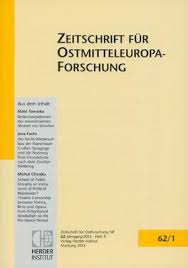Transfer, der keine Übersetzung braucht. Deutsche und polnische Wissenschaften vom Menschen im frühen 20. Jahrhundert
The Transfer that Needs no Translation: German and Polish Human Sciences in the Early 20th Century
Author(s): Maciej GórnySubject(s): Anthropology, Language studies, 19th Century, Translation Studies
Published by: Verlag Herder-Institut
Keywords: knowledge transfer; racial anthropology; anthropogeography; territorial revisionism; Ostforschung;
Summary/Abstract: In East Central Europe in the second half of the 19th century, a change took place which was rather unspectacular, but nevertheless significant for the history of ideas. Though intellectual exchange with France remained lively, this declined as German research gained importance and prestige. The increasing numbers of students from the region attending German and Austrian universities in the decades before the First World War testify to this fact. At the same time Human Sciences in Western Europe and the United States underwent a dynamic development. The new trend, under different names and within several disciplines, was towards Darwinism and racial theories. This development manifested itself in the form of new or modernized research fields such as human geography or racial anthropology. The congruence of these two phenomena resulted in the intensification of knowledge transfer between the German-speaking countries and East Central Europe. For Polish authors, however, this development presented a problem. While the German and Austrian representatives of the most advanced fields of research (such as Albrecht Penck or Gustaf Kossinna) often professed their German National Socialism, this attitude was strange at best to their Polish students and colleagues. This resulted in a fascinating reinterpretation of the scientific and pseudo-scientific theories coming from the German-speaking countries. In a ‘creative translation’ process, these were then adapted to Polish nationalism. This article analyses this process based on the cases of some Polish researchers (including Jan Czekanowski, Eugeniusz Romer, and Józef Kostrzewski). In addition, this phenomenon of German-Polish knowledge transfer is placed in the regional context of East Central Europe.
Journal: Zeitschrift für Ostmitteleuropa-Forschung
- Issue Year: 65/2016
- Issue No: 4
- Page Range: 585-606
- Page Count: 22
- Language: German

